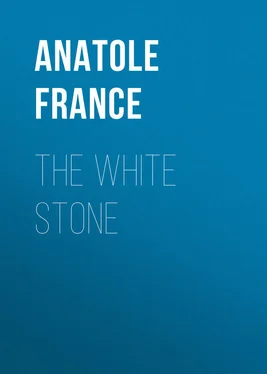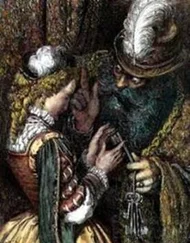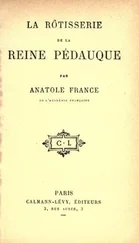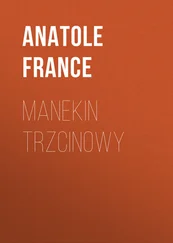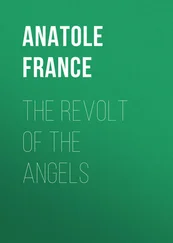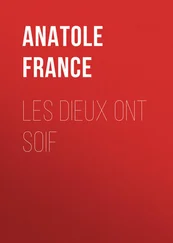Anatole France - The White Stone
Здесь есть возможность читать онлайн «Anatole France - The White Stone» — ознакомительный отрывок электронной книги совершенно бесплатно, а после прочтения отрывка купить полную версию. В некоторых случаях можно слушать аудио, скачать через торрент в формате fb2 и присутствует краткое содержание. Жанр: foreign_antique, foreign_prose, на английском языке. Описание произведения, (предисловие) а так же отзывы посетителей доступны на портале библиотеки ЛибКат.
- Название:The White Stone
- Автор:
- Жанр:
- Год:неизвестен
- ISBN:нет данных
- Рейтинг книги:4 / 5. Голосов: 1
-
Избранное:Добавить в избранное
- Отзывы:
-
Ваша оценка:
- 80
- 1
- 2
- 3
- 4
- 5
The White Stone: краткое содержание, описание и аннотация
Предлагаем к чтению аннотацию, описание, краткое содержание или предисловие (зависит от того, что написал сам автор книги «The White Stone»). Если вы не нашли необходимую информацию о книге — напишите в комментариях, мы постараемся отыскать её.
The White Stone — читать онлайн ознакомительный отрывок
Ниже представлен текст книги, разбитый по страницам. Система сохранения места последней прочитанной страницы, позволяет с удобством читать онлайн бесплатно книгу «The White Stone», без необходимости каждый раз заново искать на чём Вы остановились. Поставьте закладку, и сможете в любой момент перейти на страницу, на которой закончили чтение.
Интервал:
Закладка:
“He has not then,” asked Lucius Cassius, “inherited the evil disposition of the Domitians, his ancestors?”
“Indeed he has not,” replied Gallio. “It is Germanicus who lives anew in him.”
Annæus Mela, who was not looked upon as a sycophant, joined in the praise of the son of Agrippina. His praises appeared affecting and sincere, since he pledged them, so to speak, on the head of his son, who was still of tender age.
“Nero is chaste, modest, of a kindly disposition, and religious. My little Lucan, who is dearer to me than my eyes, was his play- and school-mate. Together they practised declamation in the Greek and Latin languages. Together they attempted to indite verse. Never did Nero, in the course of these contests of skill at versification, manifest the slightest symptom of jealousy. Quite the contrary, he enjoyed praising his rival’s verses, which, in spite of his tender age, revealed traces here and there of a consuming energy. He sometimes seemed happy to be surpassed by the nephew of his teacher. Such was the charming modesty of the prince of youth! Poets will some day compare the friendship of Nero and Lucan with that of Euryalus and Nisus.”
“Nero,” the proconsul went on to say, “displays with the ardour of youth a gentle and merciful spirit. Time will but strengthen such virtues.
“Claudius, when adopting him, has wisely acquiesced in the hope expressed by the Senate and the wish of the people. In so doing, he has removed from the Imperial succession a child overwhelmed by the shame of his mother, and has now, by giving Octavia to Nero, secured the accession of a youthful Cæsar whom Rome will delight in. The respectful son of an honoured mother, the zealous disciple of a philosopher, Nero, whose adolescence is illumined with the most agreeable qualities, Nero, our hope and the hope of the world, will remember, when clad in purple, the teachings of the Portico, and will rule the universe with justice and moderation.”
“We welcome the omen,” remarked Lollius. “May an era of happiness dawn upon the human race!”
“’Tis difficult to predict the future,” said Gallio. “Still, we experience no doubts regarding the eternity of the City. The oracles have promised Rome an empire without end, and it would be sacrilegious not to put our faith in the gods. Shall I reveal to you my fondest hope? I joyfully expect the time when peace will reign for ever on the earth, following upon the chastising of the Parthians. Yes indeed, we may, without fear of deceiving ourselves, herald the end of war so hated by mothers. Who is there to disturb the Roman peace henceforth? Our eagles have spread to the confines of the universe. All the nations have experienced our strength and our mercy. The Arab, the Sabæan, the dweller on the slopes of the Hæmus, the Sarmatian who quenches his thirst with the blood of his steed, the Sygambri of the curly locks, the woolly-headed Ethiopian, all come in hordes to worship Rome their protectress. Whence would new barbarians spring? Is it likely that the icy plains of the North or the burning sands of Libya hold in store enemies of the Roman nation? All Barbarians, won over to our friendship, will lay down their arms, and Rome, the white-haired great-grandmother, tranquil in her old age, will see the nations respectfully grouped about her as her adopted children, dwelling in harmony and love.”
All signified their approval of the foregoing sentiments, excepting Cassius, who shook his head in disagreement.
He felt a pride in his military ancestry while the glory of arms, so greatly extolled by poets and rhetors, kindled his enthusiasm.
“I doubt, my friend Gallio,” he commented, “that nations will ever cease to hate and fear one another. To tell the truth, I should not desire such a consummation. Did war cease, what would become of strength of character, grandeur of soul, and love of country? Courage and devotion would be virtues out of date.”
“Rest assured, Lucius,” said Gallio, “that when men shall cease to conquer one another, they will strive to subdue their own selves. That is the most virtuous attempt they can make, and the most noble use to which they can put their bravery and magnanimity. Yes indeed, the august mother whose wrinkles and whose hairs, blanched by centuries, we worship, Rome, will establish universal peace. Then shall the enjoyment of life be realised. Life under certain conditions is worth living. Life is a tiny flame between two infinite shadows; ’tis our share of the divine essence. During the term of his life, a man is similar to the gods.”
While Gallio was thus discoursing, a dove perched itself on the shoulder of the Venus, whose marble contours gleamed among the myrtles.
“My dear Gallio,” said Lollius with a smile, “the bird of Aphrodite takes delight in thy words. They are gentle and full of gracefulness.”
A slave approached, bearing cool wine, and the friends of the proconsul discoursed of the gods. Apollodorus was of opinion that it was not easy to grasp their nature. Lollius doubted their very existence.
“When thunder peals,” he said, “it all depends upon the philosopher whether it is the cloud or the god who has thundered.”
Cassius, however, did not countenance such thoughtless arguments. He believed in the gods of the Republic. While entertaining doubts as to the extent of their providence, he asserted their existence, as he did not wish to differ from humanity on an essential point. And to support his belief in the faith of his ancestors, he had recourse to an argument he had learnt from the Greeks.
“The gods exist,” he said. “Men have formed their idea of what they are like. Now, it is impossible to conceive an image not based on reality. How would it be possible to see Minerva, Neptune, and Mercury, were there neither Mercury, nor Neptune, nor Minerva?”
“You have convinced me,” said Lollius mockingly. “The old woman who sells honey-cakes in the Forum, outside the basilica, has seen the god Typhon, he with the shaggy head of an ass, and a monster belly. He threw her on her back, threw her clothes over her ears, chastised her while keeping time to each resounding blow, and left her for dead, after polluting her in a disgusting fashion. She has herself told how, even as Antiope, she had been favoured with the visit of an immortal god. It is certain that the god Typhon exists, since he committed an outrage on an old cake-selling hag.”
“In spite of thy mockery, Marcus, I do not doubt the existence of the gods,” resumed Cassius. “And I believe that they enjoy a human form, since it is under that form that they always show themselves to us, whether we slumber or whether we are awake.”
“It would be better,” remarked Apollodorus, “to say that men possess the divine form, since the gods existed before them.”
“My dear Apollodorus,” exclaimed Lollius. “You forget that Diana was first worshipped under the form of a tree, and that several important gods have the shape of an unhewn stone. Cybele is represented, not as a woman should be, with two breasts, but with several teats like a bitch or a sow. The sun is a god, but being too hot to assume the human form, he has taken the shape of a ball; he is a round god.”
Annæus Mela gently censured this academic jesting.
“All that is related about the gods,” he said, “should not be taken literally. The vulgar herd calls wheat Ceres, and wine Bacchus. But where is to be found the man crazy enough to believe that he drinks and eats a god? Let us indulge in a more exalted knowledge of the divine nature. The gods are but the several parts of nature, and they are all lost in one god, who is nature in its entirety.”
The proconsul signified his approval of the words of his brother, and speaking in a serious strain, defined the attributes of divinity.
Читать дальшеИнтервал:
Закладка:
Похожие книги на «The White Stone»
Представляем Вашему вниманию похожие книги на «The White Stone» списком для выбора. Мы отобрали схожую по названию и смыслу литературу в надежде предоставить читателям больше вариантов отыскать новые, интересные, ещё непрочитанные произведения.
Обсуждение, отзывы о книге «The White Stone» и просто собственные мнения читателей. Оставьте ваши комментарии, напишите, что Вы думаете о произведении, его смысле или главных героях. Укажите что конкретно понравилось, а что нет, и почему Вы так считаете.
